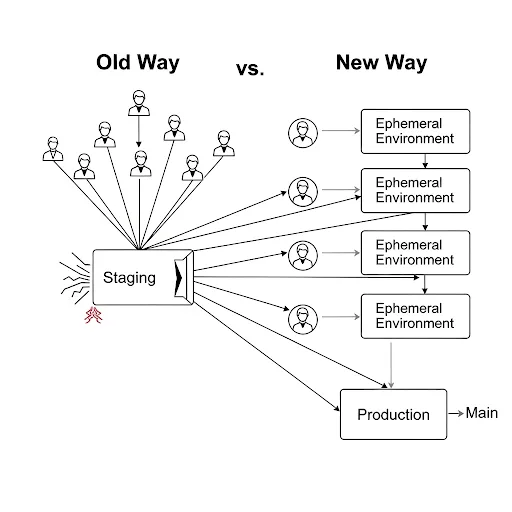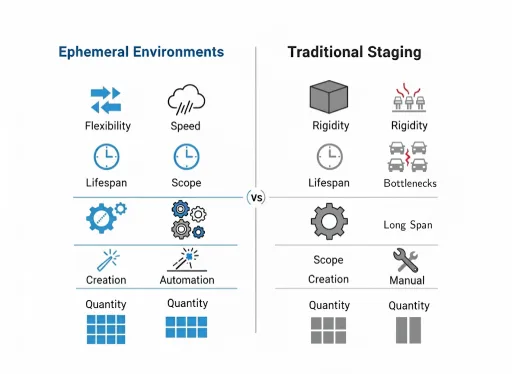Ephemeral Environments vs. Staging
A Developer’s Guide to Confident Hotfixes
What are Ephemeral Environments? Let’s give a real-world example to help better explain. It’s 4 PM on Friday. Your MS Teams Error Channel starts screaming at you—a critical bug is impacting checkout for your customers. You find the problem, a single line of faulty logic. The fix itself is simple. The hard part is everything that comes next.
You have to deploy this hotfix now. But where can you safely test it?
Your eyes turn to the shared staging server, and a familiar dread sets in. The QA team is in the middle of a full regression test for next week’s major release. If you deploy your hotfix, you’ll blow away their work and derail their entire process. Even if staging were free, you can’t remember the last time its configuration perfectly matched production. Can you really trust it for a high-stakes fix like this?
This specific nightmare, and many others like it, stem from the same core problem: the staging environment bottleneck. For years, development teams have relied on a handful of persistent, long-lived environments for testing, leading to queues, conflicts, and frustrating delays. It’s like an entire company sharing one old car—it’s never available when you need it, and you’re never sure who left their mess in the back seat.
But what if, instead of sharing one car, every developer got a fresh rental for each specific task? That’s the core idea behind ephemeral environments. This represents a key evolution in software development, offering a dynamic and efficient alternative that eliminates the bottleneck. This article breaks down the ephemeral environments vs staging debate, showing you how to turn high-stress emergencies into calm, confident processes.
But What Are Ephemeral Environments, Exactly?
At their core, what are ephemeral environments? They are complete, independent, and temporary copies of your application that are created automatically for a specific task and destroyed once the task is complete. There’s no magic here; it’s a powerful result of well-executed automation.
The mechanism is powered by a CI/CD pipeline (a set of automated steps to build and test code) that runs scripts written with Infrastructure as Code (IaC) tools (which let you define your servers, databases, and networks in configuration files).
When a developer pushes a new branch, the pipeline triggers the IaC script to perform automated environment provisioning, spinning up all the necessary components. This often involves:
- Using Docker to package individual services into containers.
- Using an orchestrator like Kubernetes to run the entire group of containers, mimicking your production setup. Kubernetes can replicate a complex microservice architecture in minutes, including all the services that communicate through a central API Gateway. Understanding the fundamentals of how Kubernetes handles Pods, Deployments, and Services is is key to implementing them effectively…
These environments are known by many names, all pointing to their on-demand nature:
- On-demand environments
- Preview environments
- Pull request environments
- Dynamic environments
- Temporary development environments


The Core Benefits of Ephemeral Environments
Adopting this model brings several powerful advantages that directly improve the developer experience (DX).
- A Faster Code Review Process For every pull request, a live preview environment is created. Reviewers can now click a link and interact with the actual changes instead of just reading code. This makes reviews faster, more thorough, and infinitely more valuable.
- Truly Isolated Testing Environments Each feature branch gets its own sandbox. This completely eliminates the “it worked on my machine” problem and prevents one team’s tests from corrupting another’s, leading to reliable, conflict-free testing. This level of isolation is a game-changer for complex systems, such as those with an event-driven architecture, where asynchronous interactions are notoriously difficult to test on shared resources.
- Achieve Genuine Production Parity Because these environments are spun up from code-based definitions that mirror production, they achieve a high degree of production parity. This drastically reduces the risk of last-minute bugs and failed deployments.
- Eliminate the Staging Bottleneck By shifting all feature and pull request testing to on-demand environments, the shared staging server is freed up. It’s no longer the single point of failure for the entire development process.
- Reduced Cloud Costs Instead of paying for large, persistent environments that sit idle overnight or on weekends, you only consume resources when an environment is actively needed. Once a pull request is merged, the environment is torn down, stopping the cloud bill.
Ephemeral Environments vs. Staging: A Head-to-Head Comparison
To be clear, a traditional staging environment still has its place. It was designed to be the final gate before production—a place for end-to-end integration tests, UAT, and performance analysis. However, its persistent, shared nature creates the limitations we’ve discussed.
Here’s a direct comparison:


| Feature | Ephemeral Environments | Traditional Staging |
| Lifespan | Short-lived (hours or days) | Persistent (months or years) |
| Scope | Single feature or pull request | Entire release candidate |
| Owner | Individual developer or team | Shared across the organization |
| Creation | Fully automated, on-demand | Manual or semi-automated |
| Primary Use | Dev, code review, feature testing | UAT, final integration tests, perf tests |
| Quantity | Many, running in parallel | One or very few |
The Real-World Challenges (A Word of Caution)


Adopting this model isn’t a silver bullet, and it’s important to acknowledge the engineering challenges. Credibility comes from understanding the trade-offs.
- Data Management: How do you populate your temporary development environments with realistic data? Managing database seeding, state, and migrations for dozens of environments is a non-trivial task.
- Resource Consumption: Spinning up many environments can be resource-intensive, requiring a solid horizontal or vertical scaling strategy for your underlying cluster to handle the dynamic load. Proper resource management and cleanup automation are critical.
- Spin-Up Time: If your application stack is massive, it might take several minutes to provision an environment. Optimizing your
docker ephemeral environmentsbuild process is key to keeping the workflow snappy. - Complexity: The initial setup requires a solid foundation in Infrastructure as Code and CI/CD automation.
How to Get Started with Implementation
Getting started feels less intimidating when broken down into steps.
- Containerize Your Application: The first step is to package your application and its services into containers using a tool like Docker. This makes your application portable and reproducible.
- Define Your Environment as Code: Use an IaC tool (like Terraform, Pulumi, or Helm charts for Kubernetes) to write scripts that define every part of your environment—from servers and databases to networking rules.
- Automate Everything in a CI/CD Pipeline: Configure your CI tool (like GitHub Actions, GitLab CI, or Jenkins) to automatically run your IaC scripts whenever a developer opens a pull request, and to tear everything down when it’s merged or closed. This is the heart of automated environment provisioning.
Conclusion: The Future is On-Demand
While the persistent staging environment still holds value for final, holistic release validation, the heavy lifting of modern development has shifted. The future is powered by the flexibility and speed of ephemeral environments. By providing isolated testing environments with high production parity for every single change, teams can deliver higher-quality software faster than ever before.
Embracing this paradigm is key to building an elite engineering organization. While this article covers the strategic shift, for a deep dive into building reliable CI/CD pipelines and IaC patterns to make this a reality, our book provides a complete, hands-on roadmap.
Further Reading
To dive deeper into the concepts and practical applications of on-demand environments, explore these high-quality resources.
- Preview Environments by Martin Fowler – A canonical article from one of software development’s most respected authors, breaking down the theory and strategic importance of preview environments.
- Preview Deployments by Vercel – An excellent example of how a leading platform implements ephemeral environments for the front-end, showing the developer workflow in action.
- The Rise of Ephemeral Environments – The New Stack – An article that explores the industry-wide shift towards ephemeral environments and their impact on DevOps and cloud-native development.
- Introduction to Kubernetes – Kubernetes.io – For those new to the underlying technology, the official Kubernetes documentation provides the best starting point for understanding container orchestration.
